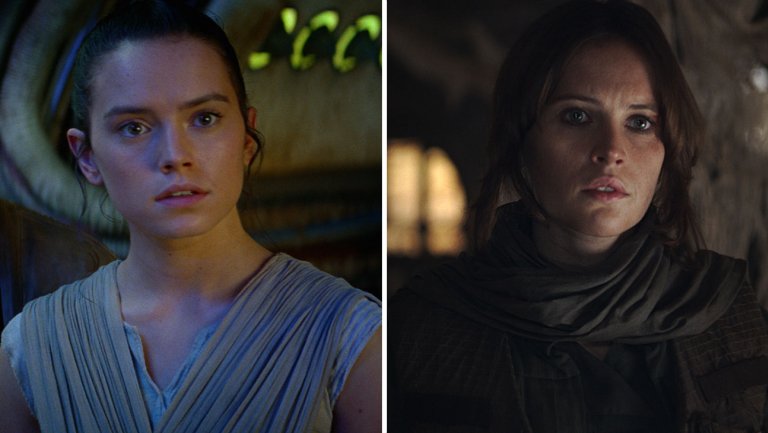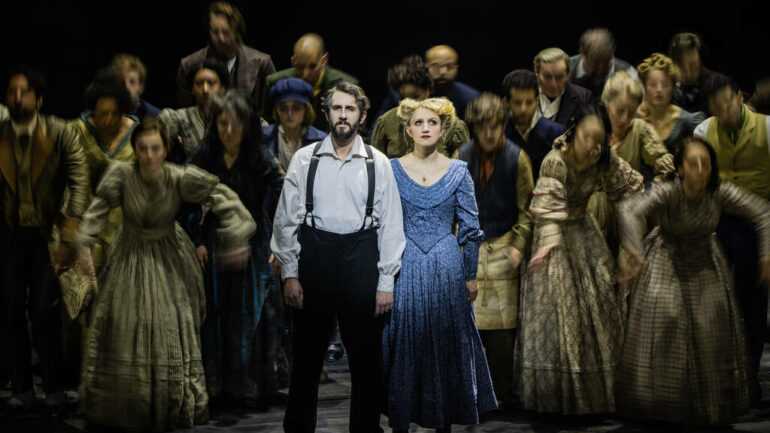So good... like you
Listeners:
Top listeners:
00:00
00:00
chevron_left
-
play_arrow
NGradio So good... like you
Two THR writers discuss the Catch-22 female filmmakers face when it comes to blockbusters.
When director Gareth Edwards’ Rogue One opens Dec. 16, the Star Wars universe will introduce its second female lead in as many movies. Daisy Ridley’s Rey has emerged as an audience favorite, and Felicity Jones’ Jyn Erso seems poised to do the same.
For a universe that for decades seemed to be populated with just a handful of female inhabitants, both of these heroes feels like a fresh breeze blowing through the stalest of Tatooine cantinas. While the onscreen female representation in the Star Wars universe is growing, the presence of behind-the-camera female talent is still noticeably lacking.
Star Wars is poised to release one film a year for the foreseeable future, and so far none of the announced projects — Episode VIII (Rian Johnson), Episode IX (Colin Trevorrow) and the young Han Solo standalone movie (Phil Lord and Chris Miller) — have female directors attached to them.
Below, The Hollywood Reporter film writer Mia Galuppo and Heat Vision blogger Graeme McMillan ask, what’s taking so long?
Mia Galuppo: Experience seems to be the biggest Catch-22 for any female director. Experience is often cited as the reason that female filmmakers aren’t entrusted with high-concept, big budget projects. Directing a studio blockbuster requires experience on a studio blockbuster, but the only way to get said experience is by directing a studio blockbuster.
Gareth Edwards and Colin Trevorrow had the all-important, big budgeted experience before taking a seat in the Star Wars director’s chair, on Godzilla and Jurassic World, respectively. But, prior to directing their respective oversized reptiles, the two lacked any sort of major studio filmmaking experience.
To me, the only argument more infuriating than the experience argument is the one that women directors don’t want to be telling these kinds of stories. But women are increasingly becoming the leads of these stories and they are heading to theaters to watch these stories. Why wouldn’t women want to be a part of making these stories?
Graeme McMillan: In a recent New York Times piece, Lucasfilm’s Kathleen Kennedy definitely sounded as if she thought she was fighting against the idea of Star Wars being a male-dominated space (No pun intended): “I would never just seize on saying, ‘Well, this is a franchise that’s appealed primarily to men for many, many years, and therefore I owe men something,’ ” she’s quoted as saying in the piece. Admittedly, that’s referring to having Rey and Jyn as leads, but it’s a quote that feels at odds with the way Lucasfilm has approached choosing directors or writers for the franchise.
I’m not meaning to accuse Kennedy (or Lucasfilm) of sexism here — I really don’t think Kennedy is intentionally against the idea of a woman director, and it’s not like the industry at large is beating down the doors of female directors for franchise properties, sadly — but there nonetheless feels like there’s a massive disconnect between what she’s saying and… well, reality. Are there really no female directors out there with as much experience as Josh Trank, who was hired (if, admittedly, then unhired) to do a standalone Star Wars movie? And even if that was true, can’t Lucasfilm and Disney do something about that? It seems to me that the Star Wars Story standalones are a perfect place to try out directors on (relatively) lower-budget projects to see how they’d handle the medium, the special effects and the mythology. Also, given the stories that escaped the set of Rogue One around the time of the reshoot announcement, are we really supposed to believe that there isn’t enough oversight on these movies to catch any directors who stumble, or keep them on track if they start to stray? Isn’t that exactly what happened on Rogue One? It just feels like a lot more can be done than saying, “Experience needed! So sad!” is what I’m really saying. But… am I wrong?
Let’s go back to what you said about the notion that women directors don’t want to be making these movies. Marvel, famously, has been looking for its first female director (for Captain Marvel… which is slated to be the MCU’s 21st film) for quite some time, and there’s still no announcement or deal as far as we know. Warners actually lost one woman in the directorial role for Wonder Woman before Patty Jenkins stepped in. Is it harder to find women for big blockbuster movies, and if so, why? Is this a Catch-22 that there aren’t qualified women because no one ever lets a woman be qualified?
Galuppo: Something that we can’t forget is that directing, maybe above all else, is a job. This fact gets overshadowed by the glitz and glamour and the talk of artistry and the prospect of having one of those fancy chairs with your name on the back of it.
The movies that are often entrusted to female directors usually fall somewhere in the realm of historical biopics, family melodramas and coming-of-age tales. Women directors are woefully underrepresented in genre films — i.e. horror, comedy, sci-fi and fantasy. Female directors need to work and, if work in genre film isn’t a viable prospect, then what financial incentive do young female filmmakers have to build a body of work in these genres? As it stands now, very little — to none at all.
That being said, with Disney’s A Wrinkle in Time, Ava Duvernay just became the first woman of color to direct a live-action film with a production budget over $100 million. A Wrinkle in Time also a classic piece of sci-fi literature. So, maybe there is a slowly growing viability for female directors being offered genre work. (Of course, Duvernay also already directed a best picture nominee).
I suppose the logical follow-up is: Why Star Wars? There are an immense amount of franchises and cinematic universes that have yet to hire a female filmmaker (looking at you, Potter). For me, having a female director enter into a cinematic universe as culturally pervasive as Star Wars, a franchise that has spanned generations and studios, would send the strongest message to audiences, as well as the industry.
McMillan: And also, Star Wars is making all the right noises. It’s talking the talk. The franchise has shifted the focus of its two most recent movies to female leads, Lucasfilm’s president is talking about not owing anything to men… it’s as if she’s so very, very close to just saying, “You know what? Let’s just bring a woman in to direct one of the movies,” yet can’t quite make that final step. It’s frustrating to watch, not least of all because, we’re talking about one of the most successful (if not the most successful) franchises in movies: If something like Star Wars can’t take the limited risk of — gasp! — having a woman actually direct one of the movies, then why should any other massive franchise?
If Star Wars were a person, this would be the point where we sat down with them and had a talk about what was holding them back and why they were afraid, before just saying, “Go on, what’s the worst that can happen?” to them over and over again. It’s ridiculous that it’s not happened yet, and as long as they keep $5 million aside to hire Tony Gilroy to come fix the movie in event of a disaster, there’s really no reason for it not to happen as soon as possible. We had to wait almost four decades for Princess Leia to be called General and treated like the woman in charge, is it going to take that long before a woman can finally take charge of her own Star Wars movie?
Galuppo: Lucasfilm, which is run by an incredibly successful woman, is really great about incorporating female perspectives into their storytelling. Kiri Hart is Lucasfilm’s development lead over nearly all of the Star Wars content out there. J.J. Abrams, the patriarch of the contemporary Star Wars universe, has said time and time again that he and his Bad Robot banner are committed to promoting the work of diverse filmmakers. (And he has proven his commitment, setting up projects with directors Marielle Heller and Julius Onah.)
Here’s what we do know. We are in the final throes of 2016 and the Star Wars slate has been announced through to 2019, with one movie coming out every year between now and then. We don’t know where Star Wars will go in 2020 and beyond. And we don’t know who will be at the helm of its projects.
I am predisposed to optimism. So, to answer your question, no, I don’t think it’ll take anywhere near to four decades to get a woman behind the camera of a Star Wars movie. It may only take four years. Heck, maybe in four years we will be lucky enough to have a woman directing a Star Wars movie — and the country.
Written by: New Generation Radio
Similar posts
ΔΗΜΟΦΙΛΗ ΑΡΘΡΑ
COPYRIGHT 2020. NGRADIO





















Post comments (0)